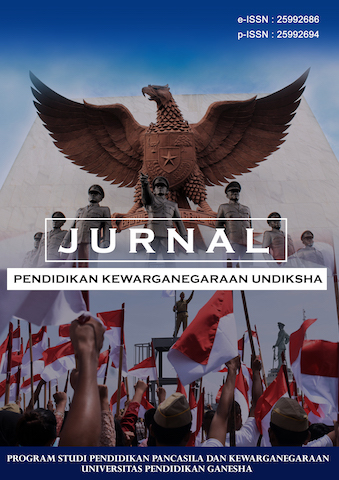PENERAPAN PRINSIP GOOD GOVERNANCE TERHADAP KUALITAS PELAYANAN PUBLIK PADA INSTANSI PEMERINTAH SEBAGAI UPAYA PENCEGAHAN TINDAK PIDANA KORUPSI (STUDI PADA DINAS KEPENDUDUKAN CATATAN SIPIL, DAN BADAN PERTANAHAN NASIONAL/ TATA RUANG KOTA TERNATE)
Keywords:
Good Governance, Prevention, CorruptionAbstract
This research aims to (1) examine the application of Good Governance principles by government agencies, the Population and Civil Registry Service (Dukcapil), the National Land Agency and Ternate City Spatial Planning; (2) reviewing the optimization of central and regional governments in enforcing the principles of Good Governance in efforts to eradicate criminal acts of corruption. This research method is empirical normative legal research (mix method). The approach used in this research is a statutory approach and a conceptual approach. Data collection techniques are carried out by conducting observations, interviews, questionnaires, and determining the sample and population. The results of the research show that (1) to realize Good Governance requires commitment and consistency from all parties, state apparatus, business world and society, and its implementation in addition to requiring good coordination, also requires integrity, professionalism, work ethic and high morals. ; (2) it is necessary to have transparent reports and strategic plans based on the principles of Good Governance in the context of implementing a government that is free from corruption, collusion and nepotism in the Population and Civil Registry Service (Dukcapil) and the Ternate City Land Office.
References
Abdullah Hehamahua, 2017, Jihad Memberantas Korupsi, Edunews Publishing Banten
Agus Widiyarta, 2012, Pelayanan Kesehatan Dari Perspektif Participatory Governance (Studi Kasus Tentang Partisipasi Masyarakat dalam Pelayanan Dasar Kesehatan Di Kota Surabaya), Disertasi Program Doktor Ilmu Administrasi Fakultas Ilmu Administrasi, Malang, Universitas Brawijaya
Ainur Rofieq, 2011, Pelayanan Publik DanWelfare State, Jurnal: g overnance,Vol. 2, No. 1, November 2011, hlm. 107-108 (diakses pada tanggal 5 Juni 2021).
Akhmad Sukardi, Participatory Governance dalam Pengelolaan Keuangan Daerah, Laksbang Pressindo, Yogyakarta.
Eddy Suhartono, 2001, Perihal Ketentuan-Ketentuan Tindak Pidana Korupsi, Buletin
Pengawasan, http/www/google.com/korupsi, (diakses tanggal 23 Pebruari 2014)
Nuriyanto, 2014, Jurnal: Penyelenggaraan Pelayanan PublikDi Indonesia, Sudahkah Berlandaskan Konsep “Welfare State”?,Vol 11 No 3 (2014), (diakses pada tanggal 6 Juni 2021).
Nuriyanto, 2014, Penyelenggaraan Pelayanan Publik di Indonesia, Sudahkah Berlandaskan Konsep “Wlefare State”?, Jurnal Konstitusi, Volume 11, Nomor 3, September
P.J.J Sipayung (Editor),1989, Pejabat Sebagai Calon Tergugat Dalam Peradilan Tata Usaha Negara, Jakarta: CV. Sri Rahayu.
Ratminto & Atik Septi Winarsih, 2006, Manajemen Pelayanan: Pengembangan Model Konseptual, Penerapan Citizen’s Charter dan Standart Pelayanan Minimal, Yogyakarta, Pustaka Pelajar.
Siswono Yudo Husodo, Indonesia: “Welfare State” yang Belum Sejahtera, dalam http://www.kompas.co.id/kompas-cetak/0604/25/opini/2605736.htm diunduh 29 Mei 2021.
Sjahruddin Rasul, 2009, Penerapan Good Governance Di Indonesia Dalam Upaya Pencegahan Tindak Pidana Korupsi, Jurnal Berkala Fakultas Hukum Universitas Gadjah Mada Volume 21, Nomor 3, Oktober ISSN 0852-100X.
Zainal Arifin Mochtar dan Hasrul Halili, Tingkat Integraitas Instansi Pelayanan BPN SAMSAT di Provinsi DIY, dikutip pada Jurnal Berkala Fakultas Hukum Universitas Gadjah Mada MImbar Hukum, Volume 21, Nomor 3, Oktiber 2009.
Downloads
Published
Issue
Section
License

This work is licensed under a Creative Commons Attribution-ShareAlike 4.0 International License.
Authors who publish with the Jurnal Pendidikan Kewarganegaraan Undiksha agree to the following terms:
- Authors retain copyright and grant the journal the right of first publication with the work simultaneously licensed under a Creative Commons Attribution License (CC BY-SA 4.0) that allows others to share the work with an acknowledgment of the work's authorship and initial publication in this journal.
- Authors are able to enter into separate, additional contractual arrangements for the non-exclusive distribution of the journal's published version of the work (e.g., post it to an institutional repository or publish it in a book), with an acknowledgment of its initial publication in this journal.
- Authors are permitted and encouraged to post their work online (e.g., in institutional repositories or on their website) prior to and during the submission process, as it can lead to productive exchanges, as well as earlier and greater citation of published work. (See The Effect of Open Access)










